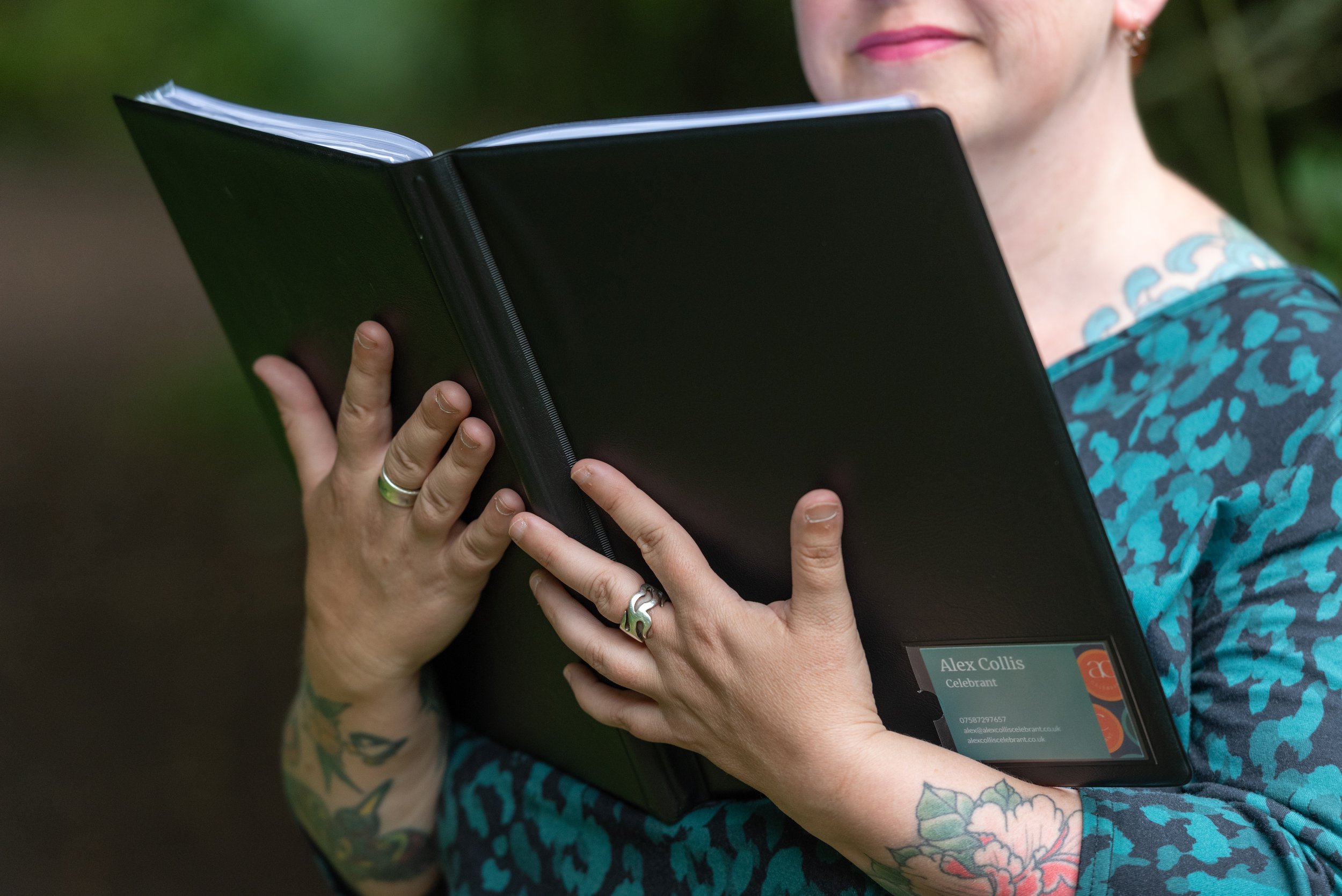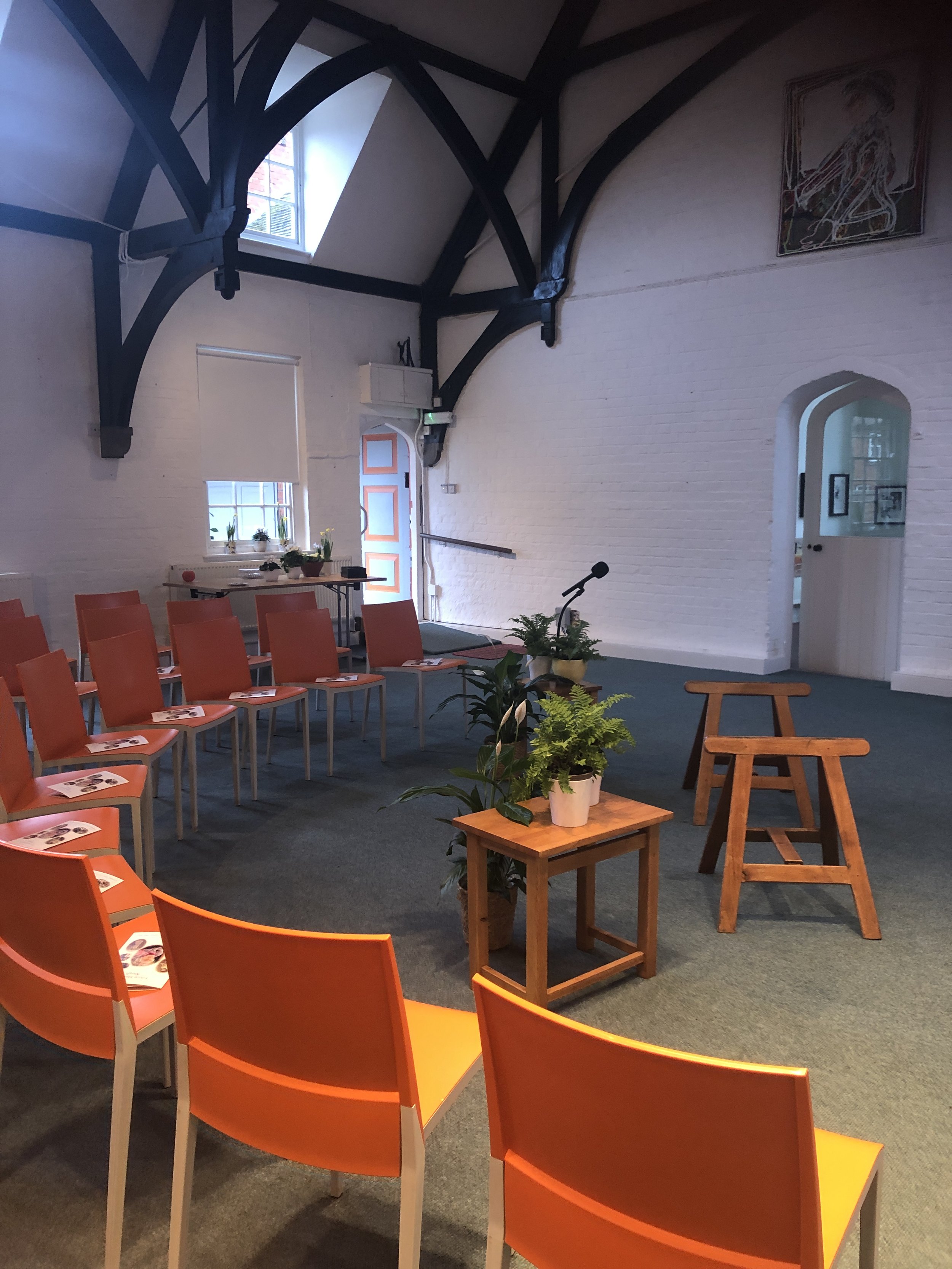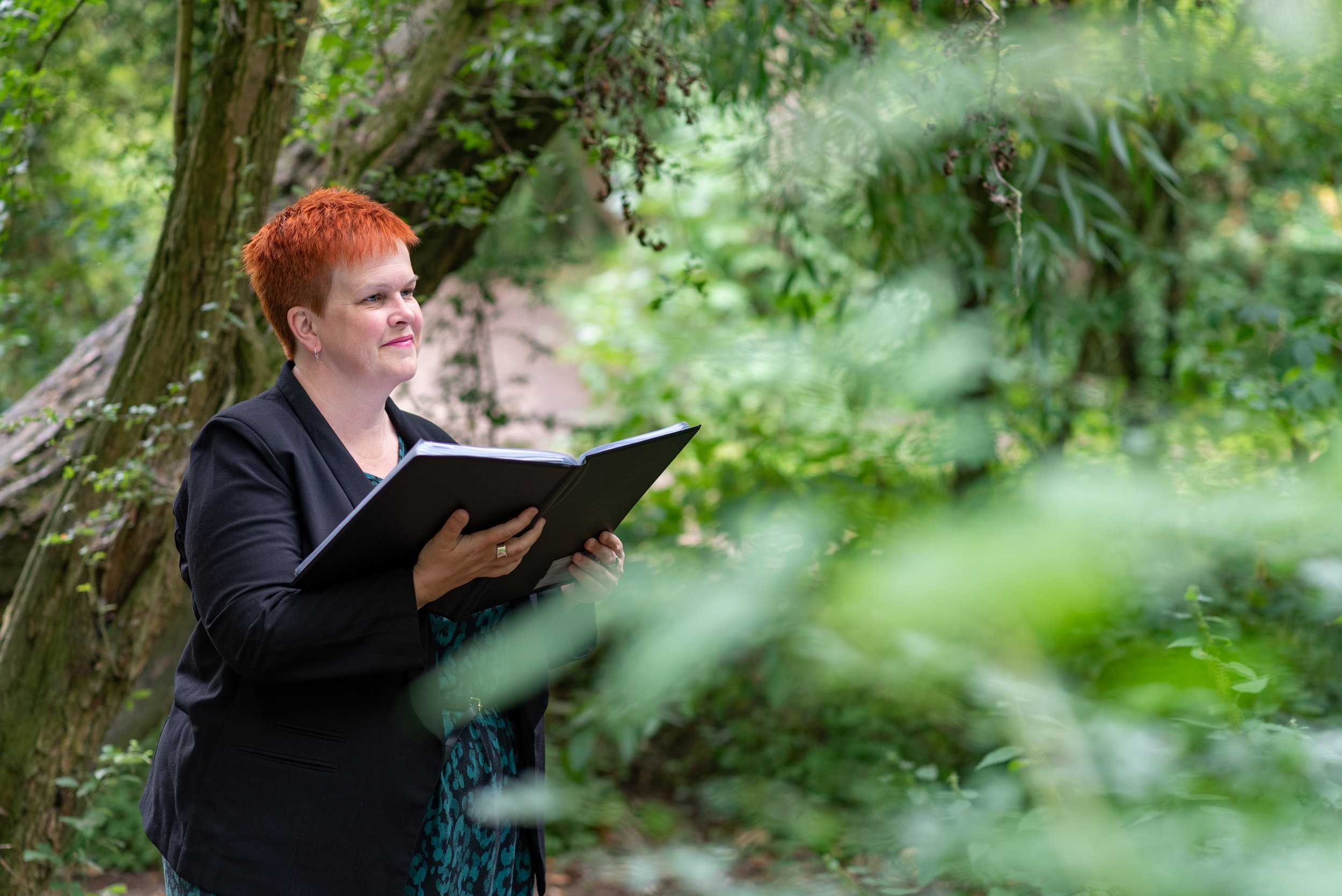What I’ve learned from leading 100 funerals…
It hardly seems possible, but recently I led my 100th funeral ceremony since training with Humanists UK back in 2019. I can so clearly remember the feelings of nervous anticipation when I headed to Leeds for my first weekend of training.
As I often say in my words of welcome at ceremonies, each funeral is specially written for and about the person whose life it is celebrating. Each funeral I have led has been different and remarkable in its own way, and I have learned something from each one. So, as I reach what felt like a really important milestone, I thought I would write down 5 of the most important or surprising things I’ve learned as a celebrant.
You can have the funeral you want…
The funeral industry is changing - probably more slowly than some of us might like, but it is changing. And it seems to be changing for the better. People are certainly becoming more aware of the range of choices open to them when they are arranging a funeral, rather than simply opting for ‘the done thing’. More choice in the funeral industry can only be a good thing, in my book. I want the families I work with to come away with a service that truly, honestly and authentically reflects their person. They need to have the funeral that is right for them.
Often when I speak with a family, one of the first things they’ll say to me is ‘I’ve never had to organise a funeral before, so I’m not really sure what I’m doing. ‘ Thankfully, arranging a funeral is not something many of us have had to do very often - if ever. It does mean, though, that it can be quite overwhelming when it does happen. Part of my role as a celebrant is to guide families through making those choices, and to help them think about what they might want to do to say goodbye to their person. To help them think through what’s possible.
Sometimes, a family member will ask me, ‘Can we really do that? Can we have that for Mum?’ The answer, pretty much every time, is ‘Yes - yes, you can.’ I’ve led cremations wearing a Pacman jacket or a Prodigy t shirt, conducted burials with graveside champagne toasts or where mourners have tossed someone’s favourite Yorkshire teabags into the grave. I’ve played all sorts of music, from the Eastenders theme to deadmau5 and everything in between. I’ve led services in back gardens, in old converted school houses, in fields, woodlands and front rooms.
Organising a funeral is one of the most important last things we can do for the people we love, and we need to be free to say goodbye in the best way possible. As a humanist, I believe that each person is unique, each person brings something different to the world while they are here - and that we should remember and celebrate that difference in the way we say goodbye to someone.
2. Storytelling is a craft - and a privilege…
It’s been said that:
“Inside each of us is a natural-born storyteller, waiting to be released.”
Essentially, what I do every day is storytelling - and how lucky I am that I get to tell those stories. I’ve always loved words, and what we can do with them. As a celebrant I get to play around with words, and use them to paint a picture of someone’s life. I’ll often look out across the rows of seats during a service and see smiles and nods of recognitions. That’s when you know you’ve told the story well, and it’s wonderful for a celebrant to see.
Over the two years I’ve been doing this, and as I’ve gained confidence and learned along the way, I’ve evolved the way in which I tell stories. I talk to someone’s family and friends to understand who they were, what their values were, what was important to them and what impact they made on the world around them. How they changed things. Then I’ll fit the biographical details around that.
What tells someone’s story most effectively, what gives the most colour-filled picture of who they were, are those little details, those quirks of personality, the anecdotes and the qualities that made them who they were. That made them human.
Sometimes, we may not have many details of the person’s life - they might have died when they were just a baby, or they might have been very private, sharing very little of themselves with friends or family. But they lived, and their life meant something. There is always a story there ready to be told. One of the most challenging ceremonies I ever led, but one of the most interesting and fulfilling was written by piecing together clues from a box of photographs someone had left behind.
I love to learn from other celebrants too, picking up ideas, and hearing how they talk about the people they are honouring. My storytelling is constantly evolving, as I collect ideas and reflect on each service I’ve led. Ask me again at 200 ceremonies, and the way I tell stories will probably be different again - I can’t wait to find out!
3. Funerals are about celebrating life, not just mourning death…
I often hear families say to me ‘She wouldn’t have wanted us to be sad’ or ‘They were happy in life, and we just want some of that lightness to be reflected in the funeral’. More and more these days, people are choosing ceremonies that are less formal, less sombre. Ceremonies that are filled with music, memories, colour - and life, just as much as death. Any funeral needs to be authentic, and to reflect the person that it’s remembering - and if that means lightness and humour sprinkled amongst the sadness, then I am all for it. 100%.
Funerals should be celebrations of life - after all, we are celebrants. That word can cause a few raised eyebrows, and many people find it easier to identify it with weddings (which I also conduct) or namings. Happy occasions.
I often talk about the ceremonies I write as being filled with colour - ‘non-traditional, personal ceremonies, filled with colour, that tell a story’. That’s my tagline. Does exactly what it says on the tin.
Each ceremony I write starts with what is often known as the eulogy, the story of the person who has died and how they lived their life. Everything else in the ceremony is fitted around that, rather than trying to fit the person into a pre-ordained structure. I don’t necessarily refer to it as the eulogy, as I find that quite formal - often it’ll have a different, more personal title. This is what provides the ‘colour’ in each ceremony. It’s about telling their story. Smiling at our memories of them.
Of course, that also means giving a full picture of who someone was - honestly and authentically. Their flaws and their foibles. The temptation can often be to talk about someone, to remember them as though they were perfect. None of us are, of course - how boring life would be if we were!
So I try and make sure that, guided by the family’s wishes, the words I write and speak celebrate the whole person. If I can achieve that, I think I’ve done my job as a celebrant.
4. It’s all about listening…
“What can I say? It is the story of our lives, and I am really amazed that you remembered everything.”
Someone said this to me in an email recently, after I sent her a draft of the eulogy I had written for her husband. She asked how I had written it when I had never met him, and the answer was very simple. It all came from her telling me that story over the course of a couple of hours. It all came from her. I just sat, listened and made notes.
I’m not going to lie, listening - really listening - to what someone is telling you is not an easy thing. But listening to people is probably the most important part of what I do as a celebrant. You need to be present, and to give people your full attention.
When I’m going to meet with someone’s family to arrange a funeral, I like to prepare by making sure I’m well-rested, that I have my travel plans organised and everything I need packed in advance. I don’t want to be rushing or tired, because I don’t think that helps me give my best to that family. And being well-rested and prepared means I’m much better equipped to listen to what they have to tell me about this person who is so important to them.
My funeral family meetings usually consist of a shorter first part, talking about some of the basic arrangements such as entry, exit, who’ll be there, what words might go into the printed order of service, if there is going to be one. I usually use that first part of the meeting to put people at their ease, before moving onto the second part - talking about the person who has died.
Usually the celebrant will not know them, so it can feel like a big responsibility to get across that information. It’s overwhelming to feel you suddenly need to tell a total stranger everything about the life of this person you love.
You’re grieving, maybe in shock, and it can be hard to know what to say. I remember when our dad died and one of my sisters and I sat with the humanist celebrant who led his funeral to talk about him, I had no idea what to tell them about him. There was so much to say, how could we sum our dad up in a short time? Would we be able to do him justice? What would we forget to say?
A good celebrant will sit with you, patiently drawing out some of those details - either with gentle questions or by reflecting back what you’ve been saying. It’s part of my role as a celebrant that I feel like I am constantly working on and developing. There is always something to learn .
What has particularly helped me is my pastoral support role as a volunteer chaplain at my local hospice. Here, each week I sit with patients and their families and just listen. To their feelings about their illness and the fact that they - or someone they love - is dying. To their anxieties and their fears. To their anger, or maybe their regrets. It’s about providing ‘a like-minded, listening ear’.
5. There is no one way to grieve…
Becoming a celebrant has taught me a lot about grief. About my own grief, and about the grief of others. Everyone deals with it differently, because everyone’s story is different.
It’s not a linear process. You don’t suffer a loss, and come out the other side, after a pre-appointed time, suddenly, magically ‘over it’ and ready to move on. And there is no one way, no right way to ‘do’ grief.
I sometimes feel guilty about the opportunities that my dad’s death opened up for me, as though I somehow shouldn’t move on and nothing good should ever come out of what still is the worst thing that has happened in my life. But, if I think about it, I doubt I’d be doing many of the things I am now - or wouldn’t have reached them by the same path - if he hadn’t died. But, of course, I want to share those things with him too.
Grief is certainly very odd.
As celebrants, we see a lot of grief in all its forms - sadness, shock, regret, anger, guilt - and our job is to walk alongside people in those early days, to bear witness to that grief. We’re not counsellors, we’re just fellow humans and, while we can’t offer expert advice, we can offer empathy - and we can listen.
There has been a huge movement in recent years towards talking more openly about grief. That we now have something called the Good Grief Festival - and I can highly recommend this excellent event - and that it would be so popular, would have seemed impossible just a few years ago.
That can only be a positive. The worst thing we can do with grief is hide it, shut it away in a little box so we don’t upset others, or make them uncomfortable. Grief is difficult, but it is natural too. We all grieve, at some point in our lives. and if we can see it as something to be shared, to shine a light on rather than hide it away in the darkness, I think it has the potential to make the process of losing someone we love much less painful. And ultimately, much less damaging.






